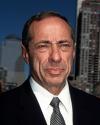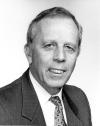Issue Date: May 23, 2003
Depression-era born and post-war New York City bred, Denis Dillon and Mario Cuomo come from the same world, though they ended up in very different places. An Irish boy from the South Bronx and an Italian kid from Queens -- smart, tough, ambitious, devout. The two burst on New York’s political scene in the mid-1970s: rising stars in a state Democratic Party searching for talent. They personified American Catholic upward mobility -- highly educated, competent in their professions, and serious about their faith. In November 1974, Democrat Dillon won election as district attorney in Long Island’s heavily Republican Nassau County. For years afterward, he would be the party’s leading vote getter -- respected as a nonpartisan prosecutor in a governmental cesspool administered by a heavy-handed Republican machine. Dillon had, in 1974, what was viewed by some as a forgivable quirk, a “Catholic thing.” He was pro-life. And he was vocal about it in a party that over the next two decades would virtually require its candidates to declare allegiance to the Supreme Court’s Roe v. Wade decision. By the mid-1980s, in a direct rebuke to Dillon, the local Democratic Party declared legal abortion a “God-given right.” Dillon called the statement “blasphemous.” His Democratic days were numbered. In 1986, he would run as the Right-to-Life Party’s candidate for governor, opposing Cuomo. Soon thereafter, he registered as a Republican. When Operation Rescue antiabortion activists took their illegal protests to Nassau County, Dillon refused to prosecute them. “I even considered resigning,” Dillon told NCR, because he believed the protesters were “morally justified.” Instead, he arranged with prosecutors in a neighboring jurisdiction to handle the cases. Long Island’s Rockville Centre diocese has honored Dillon for his pro-life activism, as did the New York State Catholic Conference. No such honors would be bestowed on the state’s most prominent Catholic, Gov. Mario Cuomo. Today, the 71-year-old former three-term governor is one of nearly 600 lawyers at Willkie Farr & Gallagher, the type of Manhattan white shoe firm that, in 1956, didn’t recruit St. John’s University Law School graduates, particularly those whose names ended in vowels. Cuomo rose to prominence in the early 1970s as the broker of a dispute between middle class homeowners and low income housing advocates over the placement of public housing in the Forest Hills neighborhood of Queens. Appointed New York secretary of state in 1975, then elected lieutenant governor, Cuomo would lose a New York City mayoral bid in 1977 before election to his first term as governor in 1982. A year after Cuomo became governor, Scranton bishop John O’Connor was named archbishop of New York (and later a cardinal). From the get-go, O’Connor made clear that Catholic elected officials who did not work to restrict abortion rights would not get a pass from his pulpit. O’Connor was a forceful and articulate advocate of the view that Catholic public officials had an obligation to work to overturn liberal abortion laws. Most Catholic pro-choice elected officials -- New York Sen. Daniel Patrick Moynihan and Congressman Charles Rangel among them -- chose not to antagonize O’Connor. They didn’t change their views or their votes, but also didn’t bring undue attention to the conflict they faced with the church. Not Cuomo. Rather than duck a fight, Cuomo took center stage at the capitol of Catholic America, the University Notre Dame, and in September 1984 articulated his view that “my church and my conscience require me to believe certain things about divorce, birth control and abortion.” But, said Cuomo, “My church does not order me -- under pain of sin or expulsion -- to pursue my salvific mission according to a precisely defined political plan.” Meanwhile, Cuomo was fighting over “life issues” on another front. His steadfast opposition to the death penalty was increasingly out-of-step with the crime-weary New York electorate. Here, he says, he found little support from the hierarchy. “I was getting beaten up in New York for being against it -- [and] getting beaten up for disagreeing with the cardinal’s view of what everybody had to do with respect to the subject of abortion. But the church wouldn’t speak on the death penalty,” said Cuomo. Times have changed. “Now the pope has spoken, and the catechism has spoken, and [it] says very clearly that the death penalty is wrong, unless it is the only way to confine the killer and deter him -- which means unless you have prisons -- and of course we have prisons.” Back in Nassau County, prosecutor Dillon has had to grapple with capital cases. Despite a post-Cuomo law putting capital punishment back on the books, Dillon has steadfastly opposed efforts to execute convicted murderers in his jurisdiction. Instead, he has established a panel to advise him on the death penalty. In keeping with modern Catholic teaching, the panel can only recommend a death sentence in cases where it is essential to protect the broader community. Dillon has, in effect, abolished the death penalty in one of New York’s largest jurisdictions -- and has done so along explicitly Catholic lines. “I apply a standard in discerning whether to use that statute, which is not really in the law -- the standard that has been set forth in [the March 1995 papal encyclical] Evangelium Vitae and also in the pope’s comments. So there’s a tension there.” Dillon is, however, content with his position. “My feeling is that everybody knows I’m a Catholic and when I run [for office] I make no secret of the fact that in some of these areas I am not going to commit what for me would be an immoral act. And if the electorate does not want me in office, they can vote me out.” -- Joe Feuerherd National Catholic Reporter, May 23, 2003 |

